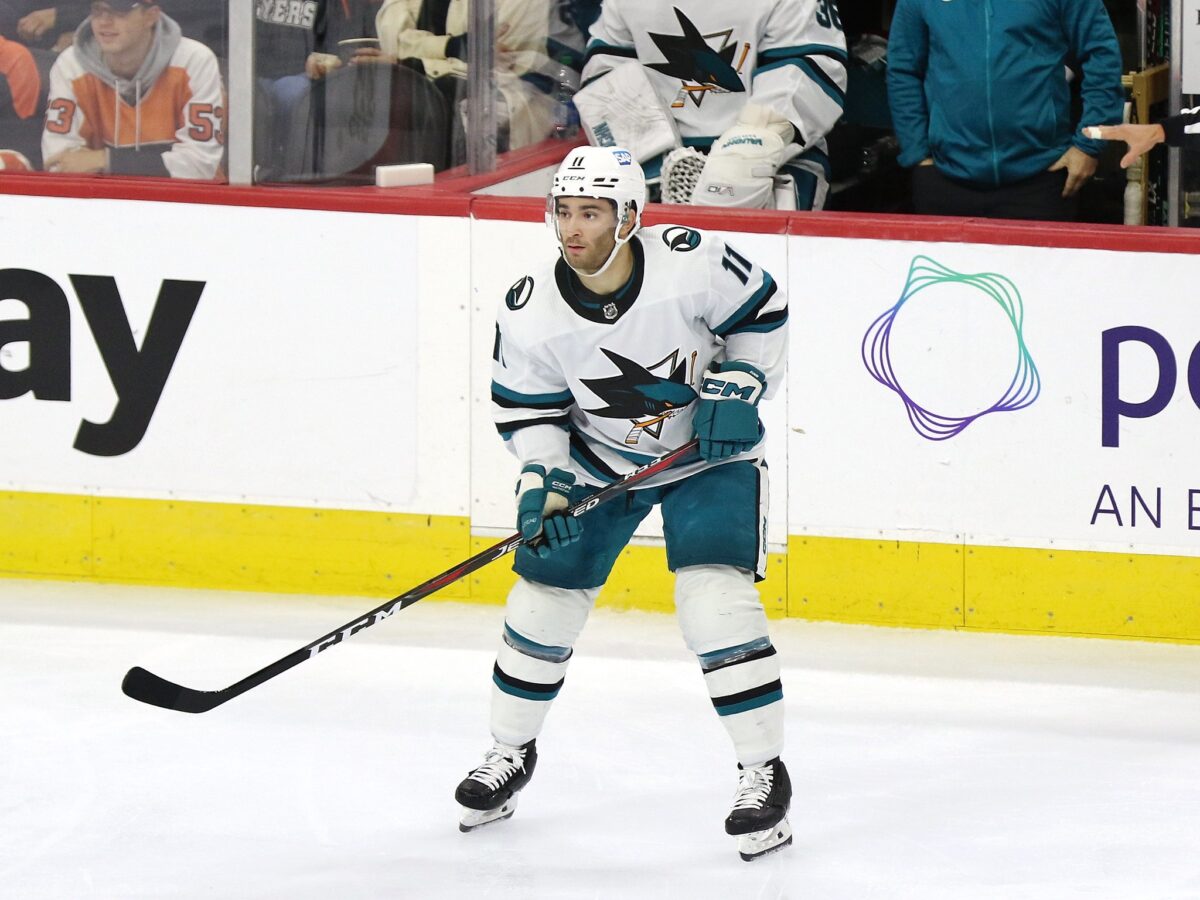On Sunday (Dec. 4), the San Jose Sharks finished a four-game road trip with three consecutive losses. While the first loss was to a Toronto Maple Leafs team that is currently second in the Atlantic Division, the other two were more disappointing, as they came in regulation against the Ottawa Senators and Buffalo Sabres, both of whom have points percentages below .500. Across the two games, the Sharks made a number of self-inflicted errors that required them to focus heavily on defense and limited their ability to generate offense, offering an explanation for why San Jose failed to earn any points.
Giveaway Disparities Force Sharks to Play on Their Heels
In both games, the Sharks committed more giveaways than their opponent. They didn’t lose the giveaway battle by much in either game, but they still found themselves playing defense more frequently than they were playing offense and having no choice but to drop back and play far less aggressively than they would have liked. The lack of attention to detail offensively led directly to multiple goals — against Ottawa, a lazy pass from Matt Benning gave Claude Giroux an easy goal, and the Senators used that play to maintain momentum for most of the rest of the game.
The matchup with Buffalo also saw a crucial goal conceded off a giveaway. As Luke Kunin entered the Sharks’ offensive zone about four minutes into the second period, he made a pass that got intercepted, giving the Sabres a run the other way. The advantage created by the turnover, combined with San Jose’s inability to meet Buffalo’s players at the blue line, led to a goal that gave the Sabres a lead they would never relinquish.
Frequent Penalties Lead to Goals and Interrupt Offensive Rhythm
One of the Sharks’ greatest strengths this season has been their ability to limit the opposing power play. They are the third-least penalized team in the league, and the league’s best penalty kill backs the penalties they do commit. Against Ottawa and Buffalo, they broke down in both of these areas.

Let’s start with the former. Across the two games, the Sharks faced an unacceptable nine power plays, and each game had one specific kind of penalty that proved particularly destructive. Against Ottawa, this penalty was holding. Oskar Lindblom and Radim Simek both committed obvious holding penalties right in front of the officials. The holds were done in honest efforts to capture the puck, but they still showed a lack of defensive positioning and a loss of control. On both subsequent power plays, the Senators scored, including the game-winning goal on the latter.
Related: Sharks’ Bad Habits Slowly Being Fixed By Quinn
“We took way too many penalties … it just can’t happen. It doesn’t matter which team you play,” Tomas Hertl told reporters after the game in Ottawa. “We can’t give [penalties] to anybody. The teams are too good. There’s a lot of good power plays.”
But the even more unfortunate penalties came against Buffalo, when Kevin Labanc and Alexander Barabanov sent the puck over the glass for a pair of delay of game infractions. Most other penalties are in the heat of the action, trying to make a play on the puck and missing. But delay of game penalties feel different. It is easy enough to avoid one that when they do occur, it is beyond frustrating. The solution is simple — just don’t put the puck in a place where it might go out of play without being touched. Making these penalties much worse is that, like against Ottawa, the two infractions led to two power-play goals, one of which proved to be the game-winner.
“To me, that’s a mental act that we’ve got to correct and get out of our game,” Sharks head coach David Quinn told reporters about the delay penalties.
But the penalties didn’t just create a disadvantage defensively. By having to go on the penalty kill so frequently, the Sharks never established any kind of offensive flow. Most of their opportunities on offense felt disjointed, with no pace or consistent tempo. This can be explained almost entirely by the frequent penalties. It’s much tougher to create offense when so much focus has to be given exclusively to playing defense and limiting the opponent.
Sharks Penalty Kill Finally Falters
Of course, the penalties would not be nearly as big a story if the Sharks’ penalty kill hadn’t allowed as many goals as it did. Of those nine power-play opportunities, Ottawa and Buffalo scored on five of them. The league’s best penalty kill finally struggled, allowing multiple power-play goals in back-to-back games after not doing so in any game prior. The unit struggled to clear the puck consistently, allowing long stretches of opponent puck possession in which the Sharks eventually tired out. The failed clearances also created a number of instances where the penalty killers had to scramble back into position and surrendered goals when unable to do so.
“What it just comes down to is moving your feet and making sure you’re not taking any penalties and giving their team any momentum,” Labanc told reporters after the Buffalo game. “We’ve just gotta work on it and make sure that we ready for next game.”
Even with the difficulties of the last two games, the Sharks still have the league’s most successful penalty kill, and they could easily get it back on track very quickly. But it’s one of a few specific aspects of the game that the team should concentrate on if it wants to win its upcoming games.
